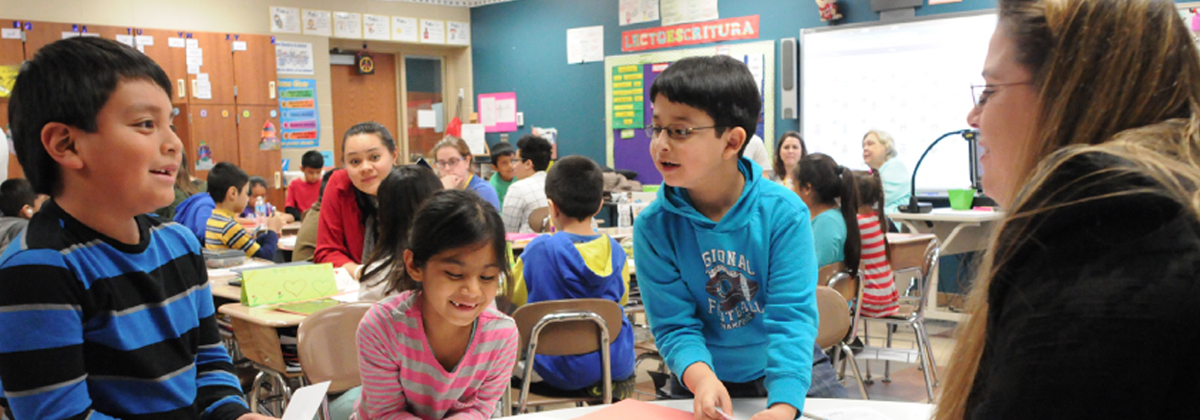- Department of Curriculum and Instruction
- Academic Programs
- M.S.Ed. in Literacy Education – ESL/Bilingual Education
M.S.Ed. in Literacy Education: English as a Second Language/Bilingual Education Specialization

Schools in the U.S. remain richly diverse, with students from every background, including those who arrive at school fluent in different languages and varieties of language. This growing population of culturally and linguistically diverse students is one that most teachers will find in their classrooms. Teachers need to know how to embrace those backgrounds as assets capable of development; how to design and implement instruction that scaffolds and sustains diverse learners; and how to advocate for families.
Our 33-hour Master of Science in Education in Literacy Education with a specialization in English as a Second Language(ESL)/Bilingual Education will prepare you to teach students while they learn English and to support their continued learning in their native language as they grow in knowledge and confidence to thrive in school.
You can complete our program in two or three years through coursework approved by the Illinois State Board of Education for ESL/Bilingual endorsement and which meets TESOL accreditation standards. You also can apply for and receive the Certificate of Graduate Study after completing 18 credits. Our program is nationally recognized by TESOL, the leading ESL professional organization.
You can apply to the NIU Graduate School as a degree-seeking student or as a Student-at-Large, which allows you to take a course while waiting for official admission to the program. Your complete application packet will require:
- Two letters of recommendation
- Your career goal statement
- Your college transcripts
During your program of study, you will:
- Plan, implement, manage and adapt instructional methods and curricular models that maximize student learning of both content and language.
- Create a learning environment that maximizes and motivates students’ learning based on knowledge of students’ interests, abilities and prior experiences and by constructing lessons that build on their background.
- Increase your understanding of language to allow you to make language development a part of every content lesson.
- Understand assessment constructs and issues and implement the appropriate assessment.
- Demonstrate and use the knowledge of the major concepts, principles and research on the psychological, sociological, linguistic, historical and cultural foundations of literacy education and ESL/Bilingual Education.
Courses are offered at NIU campuses in DeKalb and Naperville and various school districts. Courses are delivered in face-to-face, hybrid and online formats.
We prepare educators to succeed and lead through programs that are student-centered, experiential, research-informed, inclusive, innovative and collaborative. Every course includes an embedded opportunity to interact with students and other professionals to learn about best practices to help multilingual learners in their educational journeys. Some examples of these clinical experiences:
- Interview a program director to understand how a program or school district accommodates the educational needs of multilingual learners.
- Craft a unit and teach a lesson for multilingual learners that addresses multicultural goals.
- Interview a member of a marginalized community such as an immigrant learning English to understand their adaptation to the U.S.
- From a home visit to a multilingual student's family, report on the student's funds of knowledge, and design a lesson to build on them.
- Interview English learners about their native languages and develop educational strategies to address and build on the native language while students from the same language background acquire English.
- Prepare a unit and teach a lesson that integrates content and language learning.
- Develop and implement appropriate pre-and post-assessments while teaching a content lesson that integrates content and language objectives.
- Design and carry out one lesson of a unit that addresses bilingualism and/or biliteracy, reflecting on its effect on the students.
You also can take advantage of our Jerry L. Johns Literacy Clinic, which provides reading support services for K-12 students, continuing education and professional development opportunities for reading specialists and excellent practicum experiences for you.
Bilingual/English as a Second Language Endorsement (18 credits)
- LTIC 500 - Introduction to Teaching English Language Learners
- LTIC 501 - Multicultural Education: Methods and Materials
- LTIC 545 - Applied Linguistics for Teachers in Multilingual Classrooms
- LTIC 520 - Methods and Materials for Teaching English as a Second Language in Content Areas
- LTIC 535 - Teaching Language-Minority Students in Bilingual Programs: Methods and Materials
- LTIC 547 - Assessment of Language-Minority Students
You can take courses as a Student-at-Large while waiting to be officially admitted into the degree program.
Additional Courses Required for the Master's Degree (15 credits)
One of the following:
- ETR 519 - Applied Educational Research
- ETR 520 - Introduction to Research Methods in Education
- ETR 525 - Qualitative Research in Education
Two of the following:
- LTIC 525 Biliteracy Development in Spanish-English Duel Language Settings
- LTLA 539 - Issues of Diversity in Children's Literature
- LTLA 541 - Young Adult Literature
- LTLA 542 Visual and Print literacy in Children’s Literature
- Elective - An approved elective
Both of these courses:
- LTIC 515 - Bilingualism and Reading
- LTIC 598 - Issues in Teaching Multilingual Learners (Capstone seminar)
-
- According to ISBE's 2020 Annual Report on Educator Supply and Demand in Illinois, bilingual/ESL teachers are being under-produced by Illinois universities – and rank second in terms of vacancy rate.
- Nearly 250 Illinois school districts reported shortages of bilingual/ESL teachers.
- The need for bilingual/ESL teachers is so strong that many school districts have been willing to pay for groups of their teachers to complete the six required bilingual/ESL endorsement courses.
- Most school districts want teachers who can work effectively with all learners – and thus encourage their teachers to enroll in bilingual/ESL endorsement courses.
Contact Us
Department of Curriculum and Instruction
Nick Slicer, Graduate Advisor
815-753-7948
nslicer@niu.edu
Request Information
Complete this short contact form and our advisor will follow-up with specific program information.